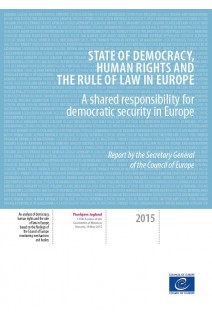



Democratic security is an old idea, based on the argument that democracies rarely, if ever, go to war with each other. Democratic practices equally protect states from internal strife. Democratic security is a responsibility which all nations share.
This second annual report on the state of democracy, human rights and the rule of law in Europe assesses the capacities of the member states to guarantee and enhance democratic security within their borders and, collectively, across the continent. It measures the extent to which the Council of Europe’s 47 member states are able to make the five pillars of democratic security a reality, namely: an efficient and independent judiciary, freedom of expression, freedom of assembly and association, the functioning of democratic institutions, and inclusive society and democratic citizenship. The report also draws on the Council of Europe’s capacity to monitor and evaluate performance in terms of democracy, human rights and rule of law and to identify remedies for shortcomings and provide assistance in their implementation.
CONTENTS
FOREWORD
EXECUTIVE SUMMARY
CHAPTER I – EFFICIENT AND INDEPENDENT JUDICIARY
Introduction
Legality and legal certainty
Judicial independence
Legal aid
Efficiency
Enforcement
Lawyer professionalism
CHAPTER II – FREEDOM OF EXPRESSION
Introduction
Safety of journalists and others performing public watchdog functions
Protection from arbitrary application of the law
Media independence
Media pluralism and diversity
Protection of freedom of expression on the Internet
CHAPTER III – FREEDOM OF ASSEMBLY AND FREEDOM OF ASSOCIATION
Introduction
Legal guarantees and favourable implementation of the law
Proper conduct of authorities during public events
Enabling civil society
Ensuring legal guarantee for NGO foundation and existence
CHAPTER IV – FUNCTIONING OF DEMOCRATIC INSTITUTIONS
Introduction
Free and fair elections
The role of the opposition
Separation of powers
Vertical distribution of powers
Good governance
CHAPTER V – INCLUSIVE SOCIETIES AND DEMOCRATIC CITIZENSHIP
Introduction
Legal protection of social rights
Effective social rights enforcement
Quality of anti-discrimination measures
Integration policies: standards and mechanisms
Access to rights for young people
Education for democratic citizenship

Democratic security is an old idea, based on the argument that democracies rarely, if ever, go to war with each other. Democratic practices equally protect states from internal strife. Democratic security is a responsibility which all nations share.
This second annual report on the state of democracy, human rights and the rule of law in Europe assesses the capacities of the member states to guarantee and enhance democratic security within their borders and, collectively, across the continent. It measures the extent to which the Council of Europe’s 47 member states are able to make the five pillars of democratic security a reality, namely: an efficient and independent judiciary, freedom of expression, freedom of assembly and association, the functioning of democratic institutions, and inclusive society and democratic citizenship. The report also draws on the Council of Europe’s capacity to monitor and evaluate performance in terms of democracy, human rights and rule of law and to identify remedies for shortcomings and provide assistance in their implementation.
